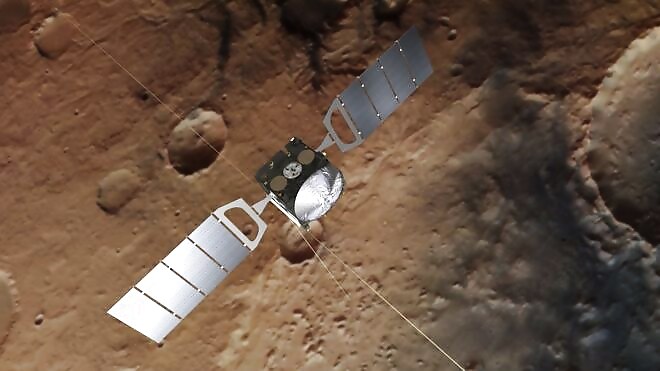
views
Mars, it seems, might have a lot more water seeping underneath its barren, red hostility. The latest development is pertaining to the debacle around Mars’ atmospheric constituency, and the possibility of water and microbial life on the planet. This took a new turn, when NASA’s Curiosity rover discovered a strong spike in methane within Mars’ atmosphere, back in June 2013. A day later, the Mars Express corroborated the same observation, through its onboard spectrometer. This, naturally, sparked interest and excitement about potential alien microbes still present somewhere within the Martian body. The studies were published recently.
Launched by the European Space Agency (ESA), the Mars Express has been in orbit around Mars since 2003. Marco Giuranna, principal investigator for the Planetary Fourier Spectrometer (PFS) aboard the Mars Express, stated that right after Curiosity picked up a spike of six parts per billion in the methane level in the Martian atmosphere, the PFS picked up a respective spike of 15 parts per billion, on the very next day. While this may seem to be barely traces (and it is bare traces, indeed), computed in correlation with Mars’ atmosphere, this volume of methane computes to nearly 46 tonnes of methane in the total of 49,000 sq km area scanned by the Express.

Apart from the fact that any atmospheric anomaly on a planet points at extraordinary incident on the surface, which further points at the possibility of a new discovery, the reason why this is exciting is because methane is generally given out into the atmosphere due to microbial activity. The same is a very common incident on Earth, which has more methane owing to its denser atmosphere. It is this that got the scientists excited, as seeing how the methane was discovered on a planet with a nearly depleted atmosphere, this meant that it had to have been synthesised recently.
However, it is important to note that methane formation also occurs through geological activity, wherein tectonic movement owing to heat and water may lead to mineral alteration on the surface, and release the gas. There is also the presence of a third possibility, where the methane may have been generated from permafrost, or permanently frozen groundwater reservoir, buried deep underneath. This is where a second piece of work by researchers at University of Southern California coincide — they, too, believe that Mars has more water than we may imagine.

The scientists, Essam Heggy and Abotalib Z Abotalib, have worked closely with the Mars Express data, and published a study detailing that Mars’ frozen groundwater may not just be concentrated at the poles. In fact, the tips of the red planet are the only places where they run shallower, and runs through the surface at up 750m depth underneath. During a change of season, heat and planetary friction applies higher pressure on the Martian water reservoir, from which traces melt away and mix within the surface. This leaves two possibilities, the primary of which is where the water and heat lead to the mineral alteration process as mentioned above and release the methane. Realistically, this is probably what has happened.
However, one cannot entirely rule out the possibility of resistant microbial life forms getting frozen within the frost millions of years ago, and releasing methane in traces into the atmosphere, when regenerated due to the added seasonal heat and pressure. This is admittedly the least likely, but life forms are known to have the ability to shut down all systems for years, thus leaving the alien life possibility open.
After all, we can never have enough of Prometheus, can we?













Comments
0 comment